Nine truths in honor of the truth that is Usurpation Day, 9 April 1792.
0 Comments
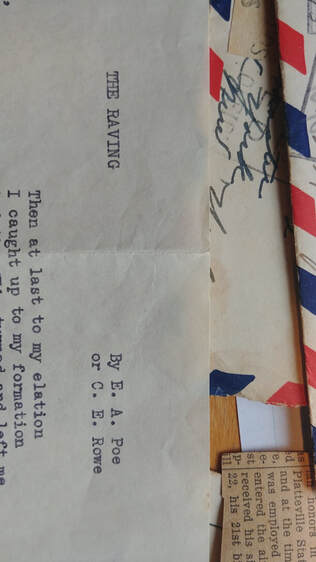 The Raving Poe Rowe The Raving Poe Rowe 1 Usurpation Day was born 9 April 1792 in Philadelphia Pennsylvania. Clifford “Tippy” E. Rowe was born 22 April 1923 in Shullsburg Wisconsin. The Raving By A. E. Poe or C. E. Rowe Once upon a mission dreary, When of combat I’ve grown weary, I had flown a thousand hours And was sure to fly some more. When suddenly there came a knocking, Sounded like some ack-ack popping – Popping like the very devil Just beneath my bomb-bay doors. T’is some Jerry quickly tho’t I Wishing to improve his score. I will use evasive tactics Even if he does get sore. Turning then I saw before me Blacker now than ere before Ack ack bursting close and heavy Guess I’d better turn some more. Opening wide I swung the bomb-bay doors And to my surprise and horror Flashing fast and bright beneath me Were some hundred guns or more. And above the shrapnel shrieking When they told us with much speech That there were only three or four. 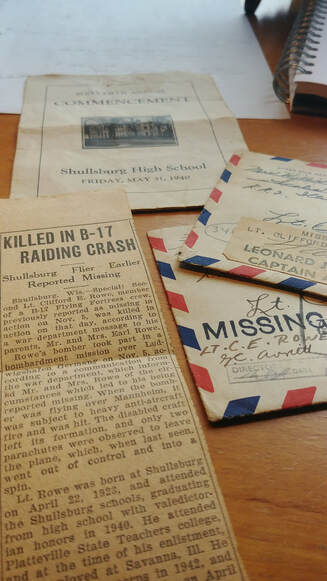 Shullsburg Missing Rowe Shullsburg Missing Rowe 2 At the end of WWI, US President Woodrow Wilson presented defeated Germany with a constitution, one unlike ours; it did not represent people according to numbers, like George Washington and the founders intended: Wilson's plan was an epic failure and catalyst for Hitler and the Nazis. Clifford Rowe graduates from Shullsburg High School in May 1940 with valedictorian honors, the same month Hitler invades Belgium, the Netherlands and France. Tippy joins the Army Air Corps in ‘42 and becomes a navigator for the B-17 bomber; he trains in Texas and leaves for Europe in June 1944. Leveling then I made a bomb run Which was not a very long one For the Varsity was on duty And I’d seen their work before. Then an engine coughed and clattered And the glass around me splattered Then I knew they had my number Just my number, nothing more. Then at last the bombs were toggled And alone away I hobbled With some fifty-seven inches And a feathered number four. While outside like ducks migrating Was a drove of ME’s waiting – Waiting all with itching fingers Just to finish up my score. I had lost my upper turret And now alone, defenseless, worried I was the saddest creature Mortal woman ever bore. And now each bright and beaming traces Coming nearer, ever nearer, Made my spirit sink within me Just my spirit, nothing more.  Clifford "Tippy" E. Rowe 1923-44 Clifford "Tippy" E. Rowe 1923-44 3 Usurpation Day is a day of remembrance for those who serve for the duration even when they are torn and tattered, nerves completely shattered. Tippy Rowe didn’t want to be a bomber anymore and yet kept being a bomber. That’s a spirit of perseverance in the face of death: just my number, nothing more, just my spirit, nothing more. Lt. Rowe was killed on 5 Nov 1944 while on a bombing raid over Mannheim Germany; the B-17 he was in was hit by anti-aircraft fire, went out of control, into a spin, and was nevermore. Then at last to my elation I caught up to my formation And the ME’s turned and left me By the tens and by the score. But my wings were torn and tattered And my nerves completely shattered And as far as I’m concerned The war is over, forevermore. Now I’ve found the joy of living And my secret I am giving To the rest of those among you Who might care to live some more. For my sinus starts to seeping Everytime they mention briefing No more flying, no more combat No more missions, Nevermore??????? Posted by Bryan W. Brickner 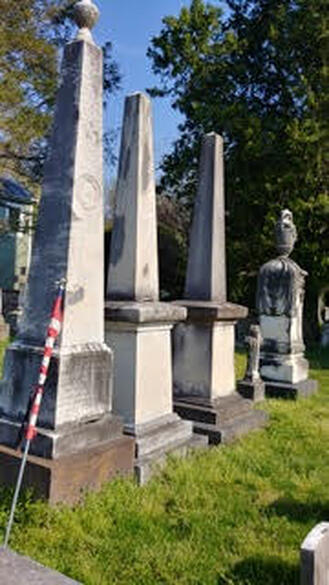 Johnny Reb and Gus Yank Berryvillin': Crows Johnny Reb and Gus Yank Berryvillin': Crows Part IX of XIII “… How’s this?” “Thanks Reb.” “Them crows got to ya Yank.” “I wasn’t sure what to think?” “I heard ‘em too.” “There are a lot of crows in Berryville.” “Yes.” “There’s even a street named Crow.” “That’s for a family.” “I thought so too, and said so to the crows.” “And?” “The crows, they wondered who that family would be named after, if not them?” “Crows.” “What is with these obelisks Johnny?” “Good question Gus.” “They’re … ” 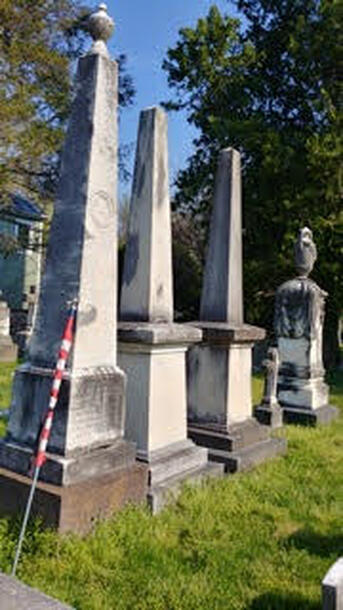 Johnny Reb and Gus Yank Berryvillin': Slavery Johnny Reb and Gus Yank Berryvillin': Slavery “… How much slavery was there here in Berryville?” “Clarke County was about half enslaved in 1860.” “Berryville’s in Clarke.” “County seat.” “These stone obelisks, crosses and testimonials, were built with slave coin.” “I hear ya.” “The stained glass windows, the brick church.” “Economy of slavery.” “We can see what enslaved people built, what their labors contributed.” “We can.” “It’s right here, here in these stones.” “And the stained glass.” “What’s next Johnny?” “Got some news Gus.” “Do tell.” 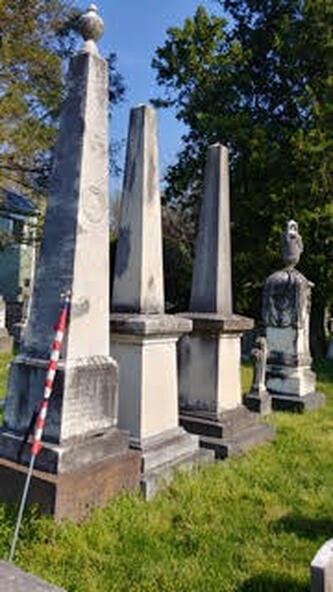 Johnny Reb and Gus Yank Berryvillin': Word Johnny Reb and Gus Yank Berryvillin': Word “The truth has come.” “The thirty Thousand.” “And the falsehood shall vanish.” “The usurpation.” “And shall not come back.” “Sounds like you’ve gotten word.” “Word is expected by 17 September Gus.” “Constitution Day.” “Yes.” “What if no word?” “Then the Office of the - ” “- Don’t say Reb.” “Right.” “Soon enough, we’ll all know.” “Meantime … let’s look for some Berrys.” “Johnny: I had forgotten our purpose.” “This way Gus …” Next Up: 17 September and part X of the series Johnny Reb and Gus Yank Berryvillin’: Smudge Day 2021. Posted by Bryan W. Brickner 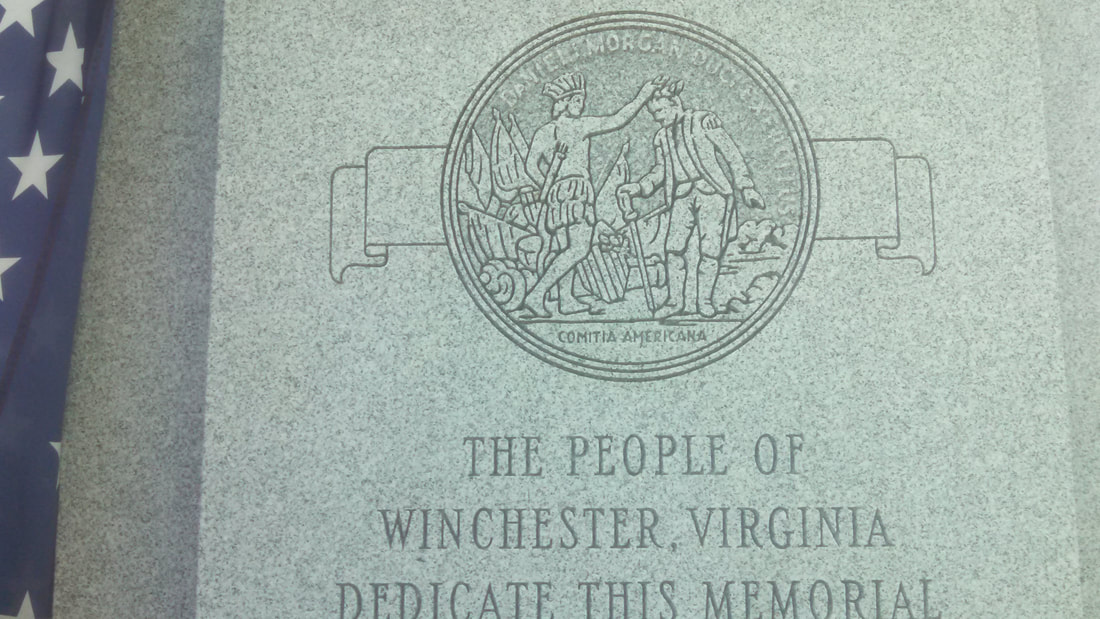 Johnny Reb and Gus Yank RMH: Jefferson Davis Johnny Reb and Gus Yank RMH: Jefferson Davis Part 9 of 13 “ … An event.” “Reb?” “Yeah Yank.” “I’ve been meaning to ask you something?” “Ask.” “How did representation work in the Confederate Constitution?” “Almost the same as the Union.” “Almost?” “Like the US one, the Confederate Constitution stipulated representation according to numbers.” “What number?” “One Representative for every fifty Thousand.” “So the Confederacy used the number found in Article the first of the Bill of Rights.” “Correct.” “Enumeration?” “On paper.” “Never happened?” “War happened.” “Did the Confederacy keep the three fifths clause?” “With an edit.” “What edit?” “Instead of saying ‘three fifths of all other Persons,’ the Confederate Constitution changed other Persons to slaves.” “Telling.” “Says a lot.” “And we can say Jefferson Davis knew more about ‘Merican representation than Tell-Lie-Vision does.” “Yes.” “Are those cannon?” “I think so …” *Next Up: 3 October and part 10 of Johnny Reb and Gus Yank Revisit Mount Horeb: Thomas Sumpter (also Sumter). Posted by Bryan W. Brickner 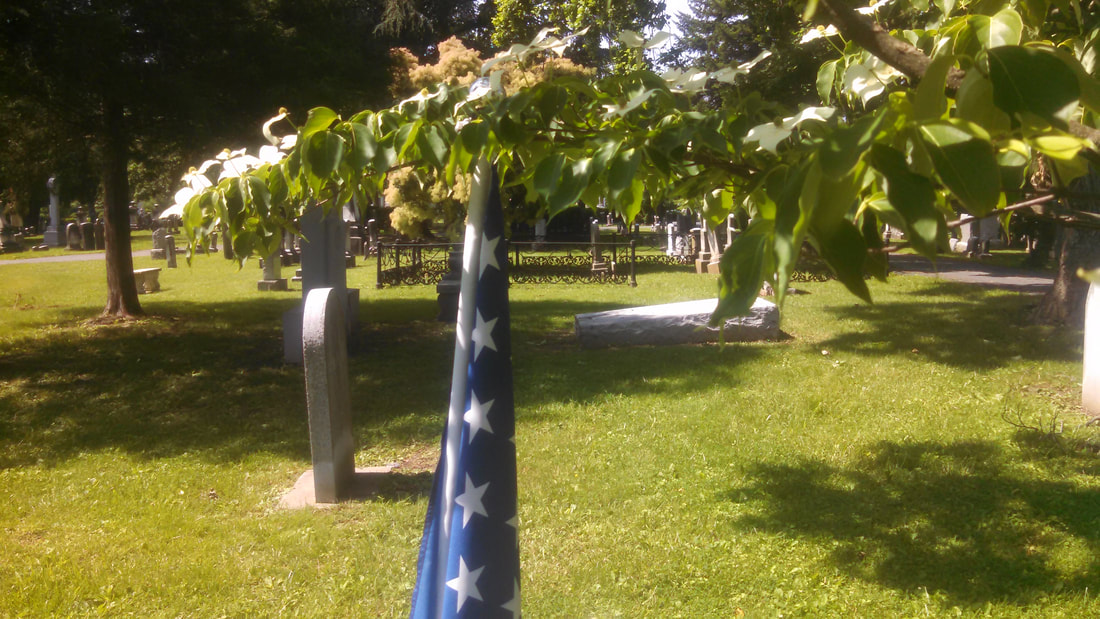 Johnny Reb and Gus Yank RMH: Tell Johnny Reb and Gus Yank RMH: Tell Part 6 of 13 “… Here we are Reb.” “Perfect.” “Almost.” “What Yank?” “No goddess.” “Like before.” “Slab’s still there.” “And Thunderbolt’s in the shadows.” “Reb – what were you gonna say about Tell-Lie-Vision and the thirty Thousand?” “That Tell-Lie-Vision is now our ally.” “It wasn’t?” “No.” “Why now Reb?” “It needs the truth.” “It tells lies with visions.” “Yet lies need truths.” “An example.” 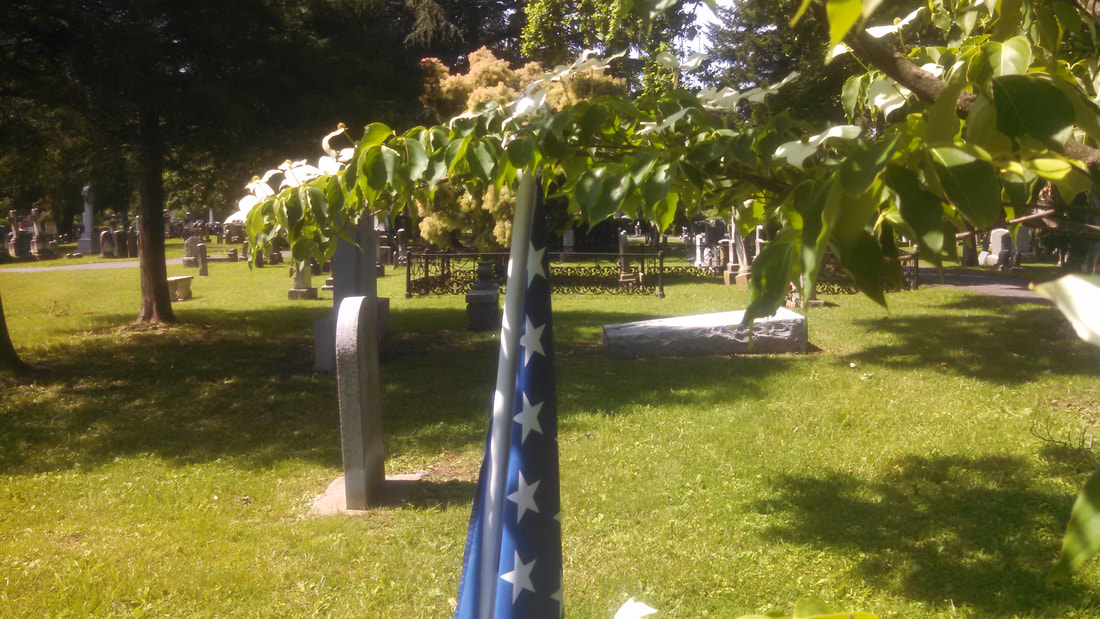 Johnny Reb and Gus Yank: Lie Johnny Reb and Gus Yank: Lie “Camp life Gus.” “Rife with rumors.” “Twenty-four seven.” “Things that disturb.” “And entertain.” “With nonsense.” “Those are Tells Gus.” “The camp takes on the Tells.” “Everyone gets all Telled-up.” “And then?” “The Tell becomes real.” “The Lie becomes real Reb.” “Correct.” “Camp gets mutinous.” “Sound familiar?” “Does Johnny.” 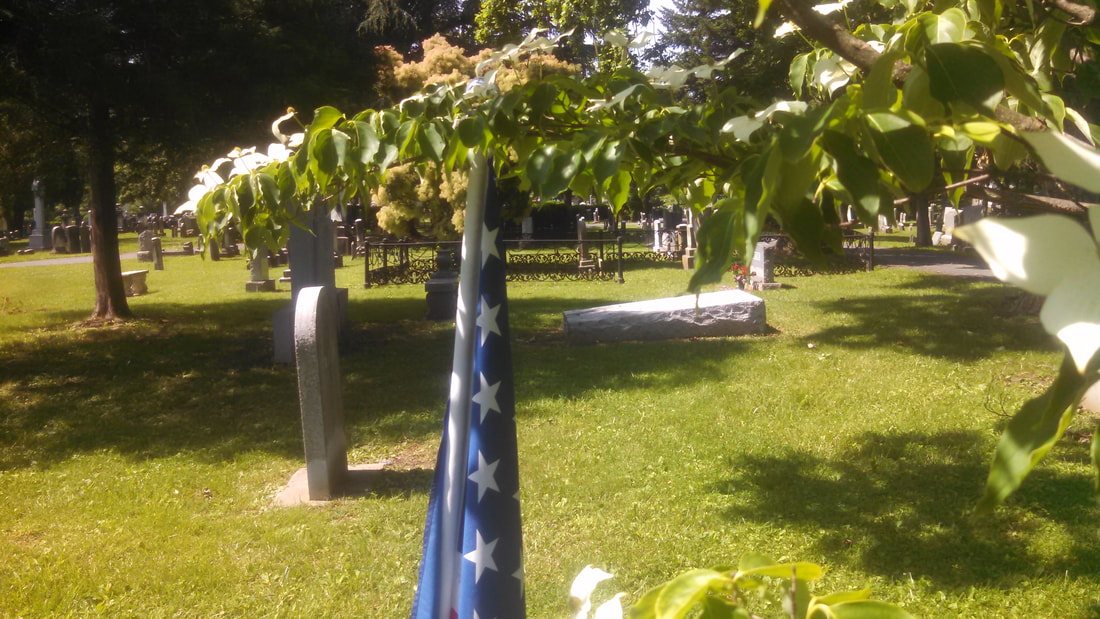 Johnny Reb and Gus Yank RMH: Vision Johnny Reb and Gus Yank RMH: Vision “Then the Vision.” “Like fire you said.” “Spreads like that Gus.” “And?” “The whole camp gets to believing the Lie.” “A correction coming.” “That’s how Tell-Lie-Vision will help us in the future.” “Sounds like a fulcrum.” “Nice.” “And the Lies have the Truths stuck in the air.” “And all constitutional questions begin and end with the thirty Thousand.” “It’s We the People Reb.” “It’s the Electoral College Yank.” “The Seventh Amendment.” “Article the first of the Bill of Rights.” “The first veto and Usurpation Day.” “And 17 September.” “Good thinking Reb.” “Thanks Yank.” “Where’d our sign go?” “The goddess?” “Yeah …” *Next Up: 27 September and part 7 of Johnny Reb and Gus Yank Revisit Mount Horeb: Daniel Morgan. Posted by Bryan W. Brickner  Cat Enumeration Cat Enumeration There is one cat in the picture. That is the actual (cat) enumeration. Article 1, Section 2, Clause 3 of the US Constitution details the purpose for taking the “actual Enumeration,” the formal count of the people of the several states, and it doesn’t mention a census or the logic for asking the people questions. It simply states: “The actual Enumeration shall be made within three Years after the first Meeting of the Congress of the United States, and within every subsequent Term of ten Years, in such Manner as they shall by Law direct. The number of Representatives shall not exceed one for every …” Congress does the count, the enumeration, by law. Then Congress is to divide by thirty Thousand, by law and as Washington taught in the first veto, for a state’s federal representation. That aggregate creates the House of Representatives for We the People. No questions asked. We the People represented according to numbers is constitutional fact, just like there’s one cat in the picture. One people. One constitution. One cat. 2020. *Next Up: 9 June and a 2020 update focusing on Hannah Arendt, American Greatness and Constitutio Libertatis. Posted by Bryan W. Brickner 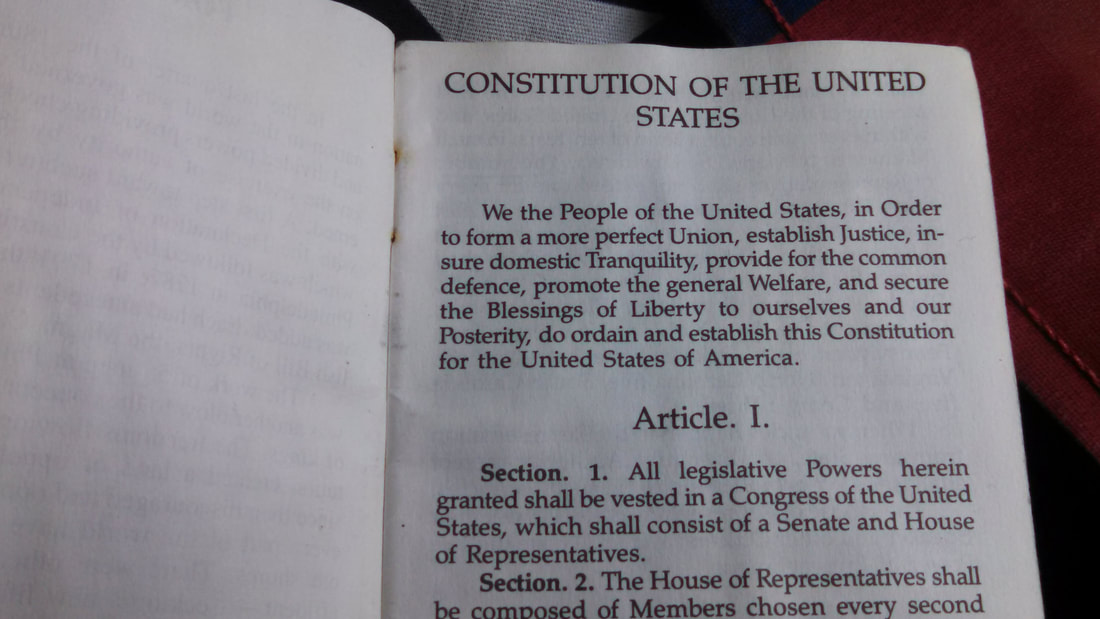 George Washington's Textbook George Washington's Textbook Today is Usurpation Day, which first happened on 9 April 1792, when the US House of Representatives broke their word and usurped a power not granted by law. What created that usurpation moment was President Washington’s first veto, which was also the first veto ever under our Constitution. President Washington, being a surveyor and Freemason, knew numbers; he also knew the Constitution, which he helped write, and which clearly states: “shall not exceed one for every thirty Thousand” (Article 1, Section 2, Clause 3). What shall not exceed thirty Thousand? That would be the number of Representatives due a state for its enumeration. In the first attempt to use the enumeration, Congress sent President Washington a bill that dropped the fraction; if a state had thirty Thousand and one, they were due, according to the phrase “shall not exceed,” another Representative. Instead, Congress dropped the fraction and did not give certain states another Representative. Washington vetoed the bill. The House of Representatives, unable to override President Washington’s veto, passed a new bill for representation on 9 April 1792, the first usurpation law, and used a divisor of “thirty-three” Thousand for representation instead. President Washington also knew of the Bill of Rights and its Article the first, the one about moving said representation ratio to forty and then fifty Thousand. Washington either let the new representation bill become law without signing it, or signed it knowing he had made his point and believing this issue would be resolved with the passage of Article the first: this has yet to happen. Washington was a creator of We the People and the idea of representing ourselves according to numbers. Twenty-twenty is the next enumeration. Why not now ‘Merica? Why not you? Time we did it, time to count the people, divide by thirty Thousand like George taught, and see what We the People really look like … according to numbers. *Next Up: 9 May and a 2020 We the People update. Posted by Bryan W. Brickner ~.~ “Those who toy with life never attain mastery. Self-discipline and courageous contemplation are necessary steps to understanding. However, do not become overzealous and drill yourself into the ground.” From Brian Browne Walker’s The I Ching or Book of Changes: A Guide to Life’s Turning Points (1992)  We the People We the People Willis and Millie The phrase ex falso quodlibet / from a falsehood, anything (follows), is known as the “principle of explosion” because it blows-up (makes trivial) how true and false work. The book Farm Boy by Archie Lieberman (1974) depicts my maternal grandparents, Willis and Mildred (Evans) Hammer, as they farmed and raised a family. I’m pretty sure Willis and Millie didn’t know any Latin other than what they learned in Bible study; they would have understood “from a falsehood, anything (follows)” though, and even taught a similar lesson: two wrongs don’t make a right. There are two great wrongs involving We the People and the usurpation of representation according to numbers. The first involves the usurpation that happened 9 April 1792, when, in response to President Washington’s veto of the first bill sent from Congress regarding the enumeration (census of 1790) and representation, the House of Representatives usurped a shall; the House ignored Washington’s veto and the constitutional ratio of "one for every thirty Thousand" and passed a number more likeable to the usurpers: one for every 33,000.  Veritas Veritas The original constitutional ex falso quodlibet may appear small and perhaps harmless, but consider this: it created the conditions for the second great usurpation, the one that began in 1920. With women getting the vote and other social disruptions within the WW1 era, the House of 1920 did something extraordinary for the second great wrong: nothing. Since the first usurpation, Congress had at least kept using a number, they just kept increasing the ratio in favor of the usurpers; instead of using the census as intended, the counting of We the People for representation, the 1920 House openly ignored Article 1, Section 2, Clause 3 of our Constitution. It wasn’t until 1929, with the next decennial enumeration looming, that a law was passed setting House representation at 435, regardless of number, thus counteracting the definition of We the People. Things tend to end as they began. The original usurpation of 9 April 1792 was a fill-in-the-blank moment; the bill was prepared with a blank left for a number and then the usurpers wrote in 33,000. We the People might follow a similar plan, one of mimicry; the 1792 usurpers read the Constitution and acted with pen and paper: nowadays, it feels like We the People are beginning to do the same thing. Veritas. *Next Up: Gus Kotka and Johnny Reb begin a summer series on Juneteenth 2018, Somewhere On Our Way. Posted by Bryan W. Brickner  Gus Kotka and Johnny Reb Thereat Events Gus Kotka and Johnny Reb Thereat Events VI of XIII “About the gain Reb?” “Yes.” “The states weren’t sectional about Article the first.” “Correct.” “You said states as different as South Carolina and Vermont passed the amendment.” “They did.” “We the People was alive and well.” “I hear ya Yank.” “And then in 70 years, them two states, South Carolina and Vermont, they was at war.” “And all the others.” “Why didn’t people in our time see that?” “People get sideways Gus.” “Lost.” “And then they create a way again.” “Back into constitutionalism.” “That’s the promise; it’ll be like this Gus.” “Like what?” “Look ahead of us.” “Okay.”  Gus Kotka and Johnny Reb Thereat Great Gus Kotka and Johnny Reb Thereat Great “Hear that?” “No.” “That’s the sound of a sun rise.” “Sunrises are great.” “The sound of greatness is not tumid.” “Does tumid mean bombastic?” “It does.” “Great is sound timelessness.” “That’s the same sun that we witnessed in April 1861.” “Reb?” “Yeah.” “We were not smart.” “Say more.” “We didn’t really read the Constitution.” “Morgan would agree.” “And for not defending We the People.” “We let a fraction tear our We apart.” “We were slaves to an idea Johnny.” “Slaves to the usurpation.”  Gus Kotka and Johnny Reb Thereat Dew Gus Kotka and Johnny Reb Thereat Dew “So great moments are quiet moments?” “‘The dew falls on the grass when the night is most silent.’” “I like the sound of that.” “A German’s words, someone from our time.” “Nice.” “He also said: ‘It is the stillest words that bring on the storm. Thoughts that come on doves’ feet guide the world.’” “So if states like South Carolina and Vermont started asking questions …” “… The usurpers would have to give answers.” “They couldn’t be silent, could they?” “Not like the dew.” “So any of the eleven states that have passed Article the first could ask?” “Any state can ask questions Gus.” “And asking questions is basic.” “It is the traditional right of the free.” “A right we should have used better, back in our day Johnny.” “Agreed Yank.” *Hempoween Up Next: A celebratory note on Tuesday, 31 October, Toast Them Hemp Seeds This Hempoween. Posted by Bryan W. Brickner  Gus Kotka and Johnny Reb Thereat Steppin' Gus Kotka and Johnny Reb Thereat Steppin' V of XIII “Steppin’ Johnny.” “With ya Gus.” “On our way again.” “With a gain.” “Which one?” “Clarity.” “Regarding the paths?” “Yes.” “Agreed.” “The two paths to 2020 step differently.” “Say more.” “One is already law.” “Article 1 and its thirty Thousand.” “And the other path is in the hands of individual states.” “You talking states’ rights Reb?”  Gus Kotka and Johnny Reb Thereat States Gus Kotka and Johnny Reb Thereat States “More like amendment rights by states.” “So We the People have options.” “We do.” “To be constitutional, we can enforce the representation ratio in Article 1.” “True.” “And the other option, the one involving states: how would that work Johnny?” “Complete the ratification of Article the first of the Bill of Rights.” “How many states have ratified Article the first?” “Eleven.” “Indiana?” “No.” “Virginia?” “Yes.” “Do you know the other states that have already ratified Article the first?” “Sure.” “Which ones Johnny?”  Gus Kotka and Johnny Reb Thereat Fulcrums Gus Kotka and Johnny Reb Thereat Fulcrums “New Jersey, Maryland, North Carolina and South Carolina.” “Okay.” “Then New Hampshire, New York, Pennsylvania and Rhode Island.” “That makes eight.” “Then Vermont, Virginia and Kentucky.” “Eleven.” “Of the original 13, only Delaware voted no on Article the first: Massachusetts, Georgia and Connecticut never voted.” “That’s interesting.” “What are you thinking Gus?” “About fulcrums.” “Fulcrum states?” “Yes: fulcrum states shift the weight.” “Good point Gus: by ratifying Article the first, those eleven states reveal evidence of the representation usurpation.” “Otherwise why did they vote for the amendment Johnny?” “Exactly.” “So We the People have eleven state allies against the usurpation.” “We do.” “That is a gain Reb.” “Yes it is Yank.” *Next Up: Sunday 29 October and Thereat part VI, Gus Kotka and Johnny Reb On Our Way Not Tumid. Posted by Bryan W. Brickner |
AuthorBrickner has a 1997 political science doctorate from Purdue University, cofounded Illinois NORML in 2001, and was a 2007 National NORML Cannabis Advocate Awardee. He is also publisher and coauthor of the 2011 book banned by the Illinois Department of Corrections – The Cannabis Papers: A Citizen’s Guide to Cannabinoids. Archives
November 2019
Categories
All
|
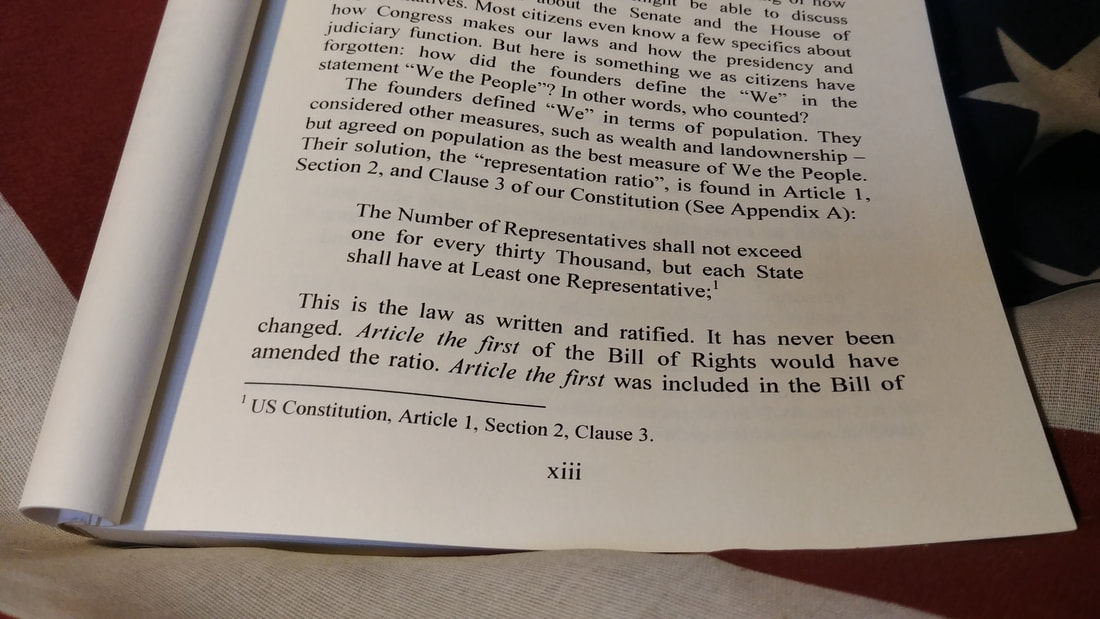
 RSS Feed
RSS Feed
